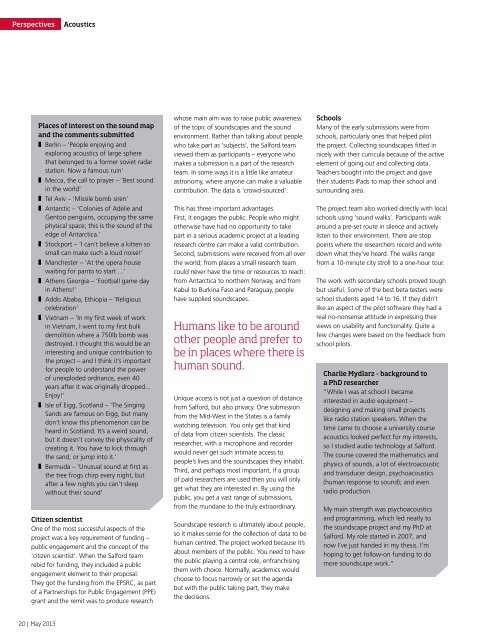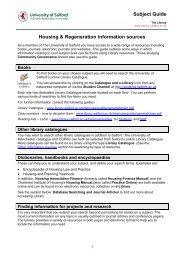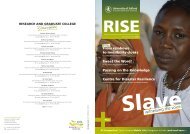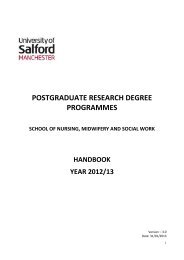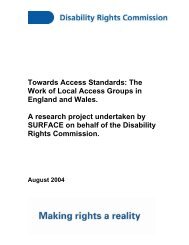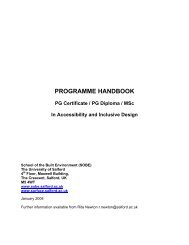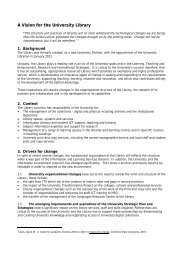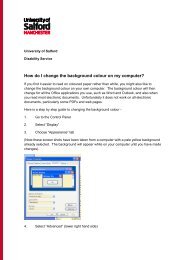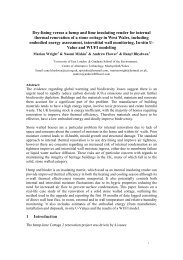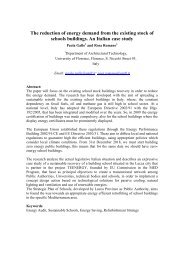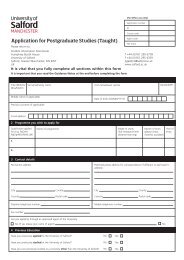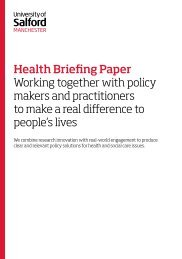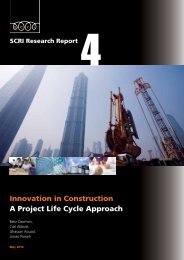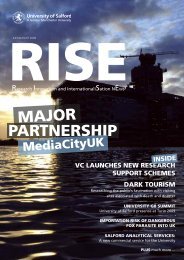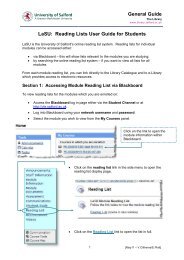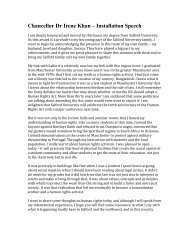Download a copy (pdf) - University of Salford
Download a copy (pdf) - University of Salford
Download a copy (pdf) - University of Salford
Create successful ePaper yourself
Turn your PDF publications into a flip-book with our unique Google optimized e-Paper software.
PerspectivesAcousticsPlaces <strong>of</strong> interest on the sound mapand the comments submitted❚ Berlin – ‘People enjoying andexploring acoustics <strong>of</strong> large spherethat belonged to a former soviet radarstation. Now a famous ruin’❚ Mecca, the call to prayer – ‘Best soundin the world’❚ Tel Aviv – ‘Missile bomb siren’❚ Antarctic – ‘Colonies <strong>of</strong> Adelie andGentoo penguins, occupying the samephysical space; this is the sound <strong>of</strong> theedge <strong>of</strong> Antarctica.’❚ Stockport – ‘I can’t believe a kitten sosmall can make such a loud noise!’❚ Manchester – ‘At the opera housewaiting for panto to start ...’❚ Athens Georgia – ‘Football game dayin Athens!’❚ Addis Ababa, Ethiopia – ‘Religiouscelebration’❚ Vietnam – ‘In my first week <strong>of</strong> workin Vietnam, I went to my first bulkdemolition where a 750lb bomb wasdestroyed. I thought this would be aninteresting and unique contribution tothe project – and I think it’s importantfor people to understand the power<strong>of</strong> unexploded ordnance, even 40years after it was originally dropped...Enjoy!’❚ Isle <strong>of</strong> Eigg, Scotland – ‘The SingingSands are famous on Eigg, but manydon’t know this phenomenon can beheard in Scotland. It’s a weird sound,but it doesn’t convey the physicality <strong>of</strong>creating it. You have to kick throughthe sand, or jump into it.’❚ Bermuda – ‘Unusual sound at first asthe tree frogs chirp every night, butafter a few nights you can’t sleepwithout their sound’Citizen scientistOne <strong>of</strong> the most successful aspects <strong>of</strong> theproject was a key requirement <strong>of</strong> funding –public engagement and the concept <strong>of</strong> the‘citizen scientist’. When the <strong>Salford</strong> teamrebid for funding, they included a publicengagement element to their proposal.They got the funding from the EPSRC, as part<strong>of</strong> a Partnerships for Public Engagement (PPE)grant and the remit was to produce researchwhose main aim was to raise public awareness<strong>of</strong> the topic <strong>of</strong> soundscapes and the soundenvironment. Rather than talking about peoplewho take part as ‘subjects’, the <strong>Salford</strong> teamviewed them as participants – everyone whomakes a submission is a part <strong>of</strong> the researchteam. In some ways it is a little like amateurastronomy, where anyone can make a valuablecontribution. The data is ‘crowd-sourced’.This has three important advantages.First, it engages the public. People who mightotherwise have had no opportunity to takepart in a serious academic project at a leadingresearch centre can make a valid contribution.Second, submissions were received from all overthe world; from places a small research teamcould never have the time or resources to reach:from Antarctica to northern Norway, and fromKabul to Burkina Faso and Paraguay, peoplehave supplied soundscapes.Humans like to be aroundother people and prefer tobe in places where there ishuman sound.Unique access is not just a question <strong>of</strong> distancefrom <strong>Salford</strong>, but also privacy. One submissionfrom the Mid-West in the States is a familywatching television. You only get that kind<strong>of</strong> data from citizen scientists. The classicresearcher, with a microphone and recorderwould never get such intimate access topeople’s lives and the soundscapes they inhabit.Third, and perhaps most important, if a group<strong>of</strong> paid researchers are used then you will onlyget what they are interested in. By using thepublic, you get a vast range <strong>of</strong> submissions,from the mundane to the truly extraordinary.Soundscape research is ultimately about people,so it makes sense for the collection <strong>of</strong> data to behuman centred. The project worked because it’sabout members <strong>of</strong> the public. You need to havethe public playing a central role, enfranchisingthem with choice. Normally, academics wouldchoose to focus narrowly or set the agendabut with the public taking part, they makethe decisions.SchoolsMany <strong>of</strong> the early submissions were fromschools, particularly ones that helped pilotthe project. Collecting soundscapes fitted innicely with their curricula because <strong>of</strong> the activeelement <strong>of</strong> going out and collecting data.Teachers bought into the project and gavetheir students iPads to map their school andsurrounding area.The project team also worked directly with localschools using ‘sound walks’. Participants walkaround a pre-set route in silence and activelylisten to their environment. There are stoppoints where the researchers record and writedown what they’ve heard. The walks rangefrom a 10-minute city stroll to a one-hour tour.The work with secondary schools proved toughbut useful. Some <strong>of</strong> the best beta testers wereschool students aged 14 to 16. If they didn’tlike an aspect <strong>of</strong> the pilot s<strong>of</strong>tware they had areal no-nonsense attitude in expressing theirviews on usability and functionality. Quite afew changes were based on the feedback fromschool pilots.Charlie Mydlarz – background toa PhD researcher"While I was at school I becameinterested in audio equipment –designing and making small projectslike radio station speakers. When thetime came to choose a university courseacoustics looked perfect for my interests,so I studied audio technology at <strong>Salford</strong>.The course covered the mathematics andphysics <strong>of</strong> sounds, a lot <strong>of</strong> electroacousticand transducer design, psychoacoustics(human response to sound); and evenradio production.My main strength was psychoacousticsand programming, which led neatly tothe soundscape project and my PhD at<strong>Salford</strong>. My role started in 2007, andnow I’ve just handed in my thesis. I’mhoping to get follow-on funding to domore soundscape work."20 | May 2013


